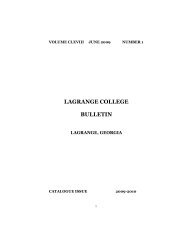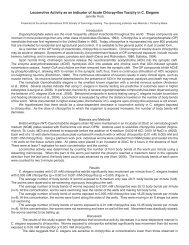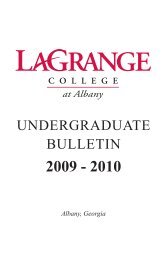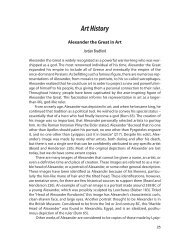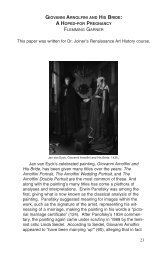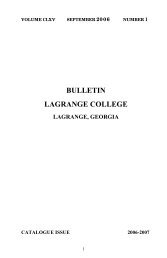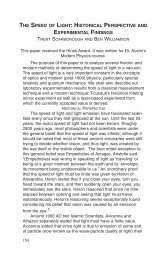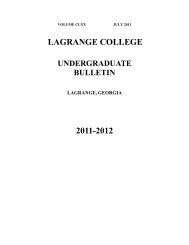Works of Mercy as a Vital Component to Sanctification - LaGrange ...
Works of Mercy as a Vital Component to Sanctification - LaGrange ...
Works of Mercy as a Vital Component to Sanctification - LaGrange ...
Create successful ePaper yourself
Turn your PDF publications into a flip-book with our unique Google optimized e-Paper software.
<strong>Works</strong> <strong>of</strong> <strong>Mercy</strong> <strong>as</strong> a <strong>Vital</strong> <strong>Component</strong> <strong>to</strong> <strong>Sanctification</strong><br />
the Aldersgate experience the importance <strong>of</strong> Christ’s grace <strong>to</strong><br />
transform and establish a new relationship. 19 Wesley learned<br />
that, “grace alone provides and remains the sure foundation for<br />
the relation <strong>to</strong> God. Grace is the substructure on which everything<br />
else is built.” 20<br />
Although Wesley w<strong>as</strong> originally excited by the strong<br />
emph<strong>as</strong>is on faith that the Moravian brethren had, it did not take<br />
him long <strong>to</strong> become weary <strong>of</strong> their doctrines. The Moravians did<br />
not share Wesley’s understanding <strong>of</strong> grace and also followed<br />
Luther by rejecting sanctification <strong>as</strong> a process. Thus, the<br />
Moravians and Wesley disagreed on the end and way <strong>to</strong> salvation.<br />
21 The disagreement between the two modes <strong>of</strong> thought is<br />
most evident in Wesley’s encounter with Philip Henry Molther<br />
and the “stillness” controversy. Molther’s b<strong>as</strong>ic argument states<br />
that one should wait upon the Lord and refrain from any works<br />
<strong>of</strong> piety or works <strong>of</strong> mercy, until persons have true faith in<br />
Christ. 22 Remaining still before the Lord ran contrary <strong>to</strong> many<br />
<strong>of</strong> Wesley’s beliefs and seriously challenged his understanding<br />
<strong>of</strong> Christian living.<br />
John Calvin’s theology <strong>of</strong> sanctification, on the other hand,<br />
is closer <strong>to</strong> Wesley’s primarily because both include the effort <strong>to</strong><br />
be res<strong>to</strong>red <strong>to</strong> the image <strong>of</strong> God. 23 Furthermore, the two traditions<br />
both describe sanctification <strong>as</strong> a process <strong>of</strong> growth in<br />
grace and a conquest <strong>of</strong> sin and evil; they also believe that<br />
there is no sanctification apart from justification and vice<br />
versa. 24 Although similar, the two traditions do diverge on their<br />
overall outlook on the sanctification/final perfection process, and<br />
in the vocabulary used. First, differences occur about when final<br />
perfection takes place. Calvin taught that sanctification is <strong>to</strong> be<br />
striven for but not expected in this life, therefore equating holiness<br />
only <strong>to</strong> a growth in faith. On the other hand, Wesley<br />
encouraged sanctification <strong>to</strong> be striven for and attained in this<br />
lifetime. 25 A b<strong>as</strong>ic difference between the two is in the vocabulary—Calvinists<br />
commonly refer <strong>to</strong> the process <strong>of</strong> Christian<br />
growth <strong>as</strong> conflict and temptation, while Methodists speak <strong>of</strong><br />
development and a governing by love. 26 At times, it seems that<br />
the two make up a battle <strong>of</strong> optimism versus pessimism.<br />
Howard Marshal, a younger scholar at Didsbury College in<br />
Bris<strong>to</strong>l, simplifies this idea by claiming that Calvin preached a<br />
164



